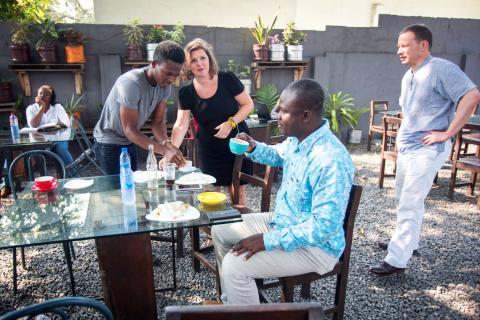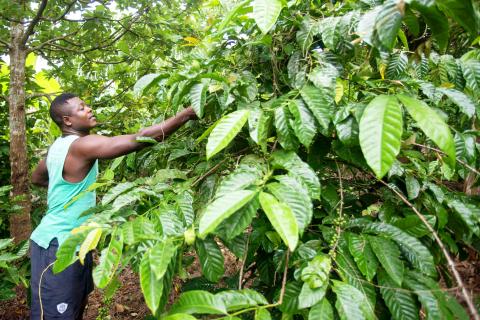Like many people around the world, 80-year-old Kofi Afadi can’t start his morning without a cup of coffee.
“Every morning when I take coffee I feel happy and go about my day,” the farmer said in his village in the green hills between Lake Volta in Ghana and the border with Togo.
“When there is no coffee it seems I am the most miserable person around here,” he said.

Photo: AFP / Cristina Aldehuela
In common with many of his fellow coffee farmers, Afadi, whose dark hair and mustache are speckled white, also grows cocoa — Ghana’s biggest crop.
The country is the second largest cocoa exporter in the world behind neighboring Ivory Coast.
Production of coffee, which was introduced to Ghana at the same time in the 18th century, trails in comparison.

Photo: AFP / Cristina Aldehuela
But it has rebounded in recent years, thanks to a growing overseas demand and a blossoming domestic market that is giving farmers hope of growing a major cash crop.
DRINKING LOCAL
A collapse in the price of coffee in the 1980s caused many Ghanaian farmers to abandon the crop, according to Michael Owusu-Manu, a researcher at Ghana’s Cocoa Board.

Photo: AFP / Cristina Aldehuela
But a government scheme launched in 2011 to revive the sector has transformed production and marketing of Ghanaian coffee.
It led to 2,400 hectares of new and revitalized coffee plantations, with farmers attracted by the introduction of fair prices for the crop.
Owusu-Manu said the impact of the scheme is easy to overlook because much of Ghana’s coffee is sold in west Africa and does not appear in official export statistics. The beans that stay in Ghana are sold to local roasters, who must compete in a market where most coffee is imported. Owusu-Manu now wants to connect local cafes popping up in Accra with local sellers.
Afadi hopes government support and a planned coffee farmers’ association will help them to wean locals off imports and establish Ghanaian beans in the home market.
FAMILY TRADITION
Ghanaian coffee is a matter of heritage and personal pride for the country’s farmers.
Afadi’s coffee farm in Leklebi Fiape, some 200km northeast of the coastal capital, Accra, is on the same plot where his father grew coffee in the 1920s.
As a child, he remembers watching his father roast and grind his own beans, transforming them into a rich black brew — just like the ones he enjoys every day. He is disdainful of the jars and single-serving sachets of instant coffee granules found on sale in supermarkets and shops.
“It doesn’t taste like coffee,” he says firmly. For now he gets his coffee from neighboring farms, including the one run by nursery manager George Klu. But Afadi is in the process of planting 900 seedlings that the government gave him for free. He expects to harvest his first crop in four years’ time when he hopes global demand will only be higher.
The International Coffee Organization reports that global annual coffee consumption has grown an average of 1.3 percent every year since 2012.
GROWN IN GHANA
Klu, 60, has two coffee farms and runs the nursery that produces the coffee seedlings for the government program. He also hopes that coffee will be a silver bullet to Ghana’s burgeoning youth unemployment.
“Our youth are trying to be reluctant about farming,” he said, cutting back weeds with a machete.
“But I may say it is just not wise for them to do so because farming is a lucrative business.” Local coffee retailers such as Kawa Mako may be part of the solution to boosting the local market.
The small coffee shop he runs was set up with local farmers in mind and proudly makes lattes, espressos, and Americanos with beans from Volta Region farms. Manager Prince Twumasi Asare said he has seen coffee consumption grow across Ghana, especially as international chains such as South Africa’s Vida e Caffe and Canada’s Second Cup have set up shop in Accra. “We want to export, to put our products in shops and malls across the country. We want people to know that coffee from Africa, from Ghana, is [of] high quality,” said Asare.

June 23 to June 29 After capturing the walled city of Hsinchu on June 22, 1895, the Japanese hoped to quickly push south and seize control of Taiwan’s entire west coast — but their advance was stalled for more than a month. Not only did local Hakka fighters continue to cause them headaches, resistance forces even attempted to retake the city three times. “We had planned to occupy Anping (Tainan) and Takao (Kaohsiung) as soon as possible, but ever since we took Hsinchu, nearby bandits proclaiming to be ‘righteous people’ (義民) have been destroying train tracks and electrical cables, and gathering in villages

Dr. Y. Tony Yang, Associate Dean of Health Policy and Population Science at George Washington University, argued last week in a piece for the Taipei Times about former president Ma Ying-jeou (馬英九) leading a student delegation to the People’s Republic of China (PRC) that, “The real question is not whether Ma’s visit helps or hurts Taiwan — it is why Taiwan lacks a sophisticated, multi-track approach to one of the most complex geopolitical relationships in the world” (“Ma’s Visit, DPP’s Blind Spot,” June 18, page 8). Yang contends that the Democratic Progressive Party (DPP) has a blind spot: “By treating any

This year will go down in the history books. Taiwan faces enormous turmoil and uncertainty in the coming months. Which political parties are in a good position to handle big changes? All of the main parties are beset with challenges. Taking stock, this column examined the Taiwan People’s Party (TPP) (“Huang Kuo-chang’s choking the life out of the TPP,” May 28, page 12), the Democratic Progressive Party (DPP) (“Challenges amid choppy waters for the DPP,” June 14, page 12) and the Chinese Nationalist Party (KMT) (“KMT struggles to seize opportunities as ‘interesting times’ loom,” June 20, page 11). Times like these can

Swooping low over the banks of a Nile River tributary, an aid flight run by retired American military officers released a stream of food-stuffed sacks over a town emptied by fighting in South Sudan, a country wracked by conflict. Last week’s air drop was the latest in a controversial development — private contracting firms led by former US intelligence officers and military veterans delivering aid to some of the world’s deadliest conflict zones, in operations organized with governments that are combatants in the conflicts. The moves are roiling the global aid community, which warns of a more militarized, politicized and profit-seeking trend